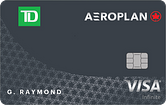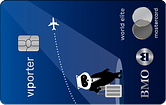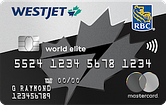Best Airline Credit Cards in Canada for 2026
An unbiased comparison of the best airline card credits in Canada
According to 126+ data points, the best airline credit card is the TD Aeroplan Visa Infinite Privilege Credit Card, followed by the CIBC Aeroplan Visa Infinite Privilege Card and American Express Aeroplan Reserve Card.
Yes, all of the top airline cards come from the Air Canada family of credit cards, one from each bank that issues Aeroplan credit cards.
| Credit card | Average earn rate | Airline perks included | Annual fee | |
|---|---|---|---|---|
| #1 | TD Aeroplan Visa Infinite Privilege Credit Card | 2.78% | * Free first checked bag * Unlimited Maple Leaf lounge access * Priority check-in, boarding, and baggage handling * Annual companion voucher when you spend $25,000 per year | $599 |
| #2 | CIBC Aeroplan Visa Infinite Privilege Card | 2.78% | * Free first checked bag * Unlimited Maple Leaf lounge access * Priority check-in, boarding, and baggage handling * Annual companion voucher when you spend $25,000 per year | $599 |
| #3 | American Express Aeroplan Reserve Card | 2.79% | * Free first checked bag * Unlimited Maple Leaf lounge access * Priority check-in, boarding, and baggage handling * Annual companion voucher when you spend $25,000 per year | $599 |
The best airline cards offer exclusive benefits when travelling with a specific airline, such as free checked bags and priority airport services. With these details in mind, our Genius Ratings adds extra weight to not only rewards, but also the perks offered by each airline credit card.
To qualify for this list of top airline credit cards, a card has to be a part of the airline's rewards program. Credit cards that allow you to transfer points to an airline rewards program are not eligible.
This article provides a breakdown of the best cards available, explains how to choose the best card for your needs, and reviews the various airline reward programs.
Key Takeaways
- The TD Aeroplan Visa Infinite Privilege Credit Card is the best airline credit card.
- Air Canada, Porter, and WestJet all offer credit cards for Canadians.
- The BMO VIPorter World Elite Mastercard is the best airline card for Porter loyalists.
- The WestJet RBC World Elite Mastercard is the best airline card for those who prefer WestJet.
- Airline credit cards offer both terrific rewards and airline perks.
The best airline credit cards in Canada
Our Gold award for the #1 airline credit card in Canada goes to the TD Aeroplan Visa Infinite Privilege Credit Card. With an incredible welcome bonus worth as much as $1,700, a huge insurance package, and a lengthy list of Air Canada perks, this card more than earns its crown.
Our Silver award goes to the CIBC Aeroplan Visa Infinite Privilege Card. It's very similar to the TD Aeroplan Visa Infinite Privilege Credit Card, with a solid (though slightly smaller) insurance package and valuable perks for you and up to eight travel companions.
And our Bronze award goes to the American Express Aeroplan Reserve Card, which offers the highest earn rate on spending with Air Canada and Air Canada Vacations, along with sweet Amex benefits.
If you're an Air Canada fan, but require a much lower annual fee, we recommend the TD Aeroplan Visa Infinite Card. But if you prefer flying with Porter, the BMO VIPorter World Elite Mastercard is your top choice. For WestJet loyalists, the WestJet RBC World Elite Mastercard is the best card for the job.
Canada's best airline credit card: the TD® Aeroplan® Visa* Infinite Privilege* Credit Card

The TD Aeroplan Visa Infinite Privilege Credit Card is the best airline credit card in Canada. It has the top-notch combination of Aeroplan rewards, Air Canada perks, and extra perks even if you're flying with a different airline.
Its Air Canada-specific perks include a free checked bag for you and up to eight travelling companions, priority check-in and boarding, and Maple Leaf lounge access. If this doesn't turn heads, the Visa Infinite Privilege (VIP) benefits will. With these, you'll have priority airport benefits at Ottawa, Montreal, and Toronto-Billy Bishop airports, plus a Visa Airport Companion membership with six free passes.
Of course, a travel card like this comes with an impressive insurance package: 12 types of coverage amounts, including 31 days of emergency medical services capped at $5 million. You even have mobile device coverage, which protects your cell phone against damage whether you're at home or abroad.
Silver award airline credit card: CIBC Aeroplan Visa Infinite Privilege Card

The CIBC Aeroplan Visa Infinite Privilege Card is extremely similar to the TD Aeroplan Visa Infinite Privilege Credit Card, with the same rewards structure (an average 2.78% earn rate with Aeroplan) and the same Air Canada benefits (free checked bag, priority boarding, etc.).
It also has the same Visa Infinite Privilege benefits, including dedicated concierge services and airport lounge access. And, largely because of its VIP label, this card has the same $599 annual fee and same income requirements ($150,000 personal or $200,000 household) as its TD counterpart.
However, the CIBC Aeroplan Visa Infinite Privilege Card's insurance package is slightly different. It offers the same 12 types of coverage, but this CIBC card provides 10 days of emergency medical coverage for seniors, compared with the TD card's four days. There's also 180 days of purchase protection – significantly more than the TD card's 120 days.
Bronze award airline credit card: American Express® Aeroplan®* Reserve Card
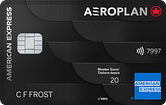

Yet another premium Aeroplan card fills out our podium, this one from American Express – the American Express® Aeroplan®* Reserve Card. Like the others, it also has a high annual fee of $599 that, for the right person, is more than cancelled out by its high-value features and perks.
Unlike the top two cards on our list, this card doesn't have any income requirements. If you really want those Air Canada perks but don't meet TD or CIBC's high income requirements, the barrier to entry is much lower with this Amex option. And, despite this lower barrier, the American Express Aeroplan Reserve Card comes with an incredible welcome bonus, worth up to $1,700 – the same as our gold-winning airline card, the TD Aeroplan Visa Infinite Privilege Credit Card.
The rewards are different here, and skew higher towards Air Canada and restaurant purchases:
- 3 points per $1 spent on Air Canada
- 2 points per $1 spent on dining and food delivery purchases in Canada
- 1.25 points per $1 spent on all other purchases
This translates to roughly 50,175 Aeroplan points per year.
This Amex card includes a Priority Pass membership, and while it doesn't include any free passes, the membership alone is quite valuable. It does, however, include very generous perks and benefits through Amex Offers and Front Of The Line, plus very special treatment at Pearson Airport in Toronto – priority security checks, complimentary valet parking, and more.
The best Aeroplan credit card with a standard annual fee: TD® Aeroplan® Visa Infinite* Card
The high annual fees on our top three airline cards can be hard to swallow, but luckily, the TD® Aeroplan® Visa Infinite* Card offers an attractive alternative. Representing a slightly lower tier in the Air Canada family of cards, this card's $139 annual fee is not only reasonable, but waived for the first year. The lower requirements of $60,000 personal and $100,000 household income cement this card as a solid, easy-access option for Air Canada lovers.
Earning as many as 1.5 Aeroplan points per dollar, this card earns an average return of 2.33%. Spending $3,000 per month earns you around 41,850 points per year.
You do get some Aeroplan/Air Canada perks with this card, but they're quite reduced. The most significant benefit is the free first checked bag, which still saves hundreds of dollars on any trip. The insurance is also pared back too. The amount and types of coverage stay the same as its VIP counterpart, the TD Aeroplan Visa Infinite Privilege Credit Card, but the coverage amounts are lower – 90 instead of 120 days of purchase protection, 21 instead of 31 days of emergency medical coverage, etc.
The best credit card for Porter: BMO VIPorter World Elite®* Mastercard®*
Aeroplan and Air Canda aren't the only options for airline credit cards – for the Porter Flyer, our top card is the BMO VIPorter World Elite®* Mastercard®*. For a $199 annual fee, here's what you'll earn for VIPorter points on purchases.
- 3 points per $1 spent on Porter
- 2 point per $1 spent on gas, transit, groceries, restaurants, and hotels
- 1 point per $1 spent on all other purchases
Based on these earn rates, cardholders earn about 54,000 VIPorter points per year when spending $3,000 per month.
Unlike other airline cards, Porter offers its cardholders VIPorter Venture status, its middle-tier, which usually requires $3,000 in annual spending. While it may not be the best that VIPorter has to offer, this tier still provides a complimentary carry-on, one free checked bag, free seat selection, and more.
The BMO VIPorter World Elite Mastercard comes with an annual companion pass, though cardholders must spend $50,000 per year to access it. True, this isn't quite as convenient or valuable as companion passes offered by other cards, but it's still a very valuable feature for the right person.
The best credit card for WestJet: WestJet RBC World Elite Mastercard
The WestJet RBC World Elite Mastercard is WestJet's premium credit card, and a terrific option for loyal WestJetters. It earns WestJet Rewards points, up to 2 points per $1 spent, for an average annual earn rate of 1.66%. Spending $3,000 per month turns your purchases into 59,850 points for the year.
Similar to other top airline cards, the WestJet RBC World Elite Mastercard provides your first checked bag for free and up to eight travelling companions. The biggest bonus this card offers is an annual companion voucher that requires just $5,000 in card spending to access, making it the most accessible voucher of its kind available from airline credit cards.
With 12 types of insurance coverage, including rare mobile device protection, plus the incredibly substantial companion voucher offer, this card's $139 annual fee is very surprising. In fact, it's the lowest annual fee among our top airline credit cards.
Compare all top airline credit cards by Genius Rating
Here's a summary of the top airline credit cards in Canada as determined by our data-driven Genius Rating:

Awards are given out once a year but rating and rankings can shift throughout the year. The #1 card for 2026 is pinned to the top.
The Genius Rating methodology
When evaluating any credit card, we compare over 126 features across seven main categories. For airline credit cards, we give more weight to the rewards and perks they offer, which are their primary features.
Here's the breakdown.
- Rewards: 38%
- Perks: 38%
- Fees: 9%
- Insurance: 8%
- Interest: 3%
- Approval: 2%
- Acceptance: 2%
How to choose the right airline credit card
When choosing an airline credit card, its rewards and associated perks are the most important factors to consider. Each airline loyalty program is unique, and each credit card's system of earning these loyalty rewards is different.
The same goes for a card's perks. Many airline perks are similar, but not exactly the same, so you may need to inspect the fine print and compare the nitty-gritty details of each option.
Here are our guidelines to help you when choosing an airline credit card:
Rewards
A lot of choosing an airline credit card comes down to the rewards – namely, which airline program fits both where you live and where you travel?
As an example, if you live in Western Canada, Porter may not be the best choice for you – you'll be limited to flying to Toronto and destinations to the east/south. Conversely, for Atlantic Canadians, WestJet is not always a good choice either due to limited flights.
If you're unsure, Air Canada's one-size-fits-all mentality may be your best option. As the largest airline in Canada, it can almost always get you where you want to go, though you may find yourself travelling through Montreal, Toronto, or Vancouver.
No matter which card you choose, your free flights will be limited to the airline and some of its partners. Yes, Aeroplan also has merchandise/gift card options, but unless you're trying to burn points you'll never use, you probably shouldn't redeem in this way. This option severely undercuts the value of your points.
To help, here's a look at the average annual earn rates of the six cards on our list of best airline credit cards:
Tip: No matter what credit card you use, you could be earning bonus cash back on top of your card's rewards. Input your monthly spend in the GeniusCash app, and level up to earn real cash.
Perks
A big pro of airline-specific cards is the airline perks they offer, which can save you considerable money. For example, checked bags are costly, easily $35 each plus tax or more, one way. If you're flying with a group of four people and everyone checks a bag, using the right credit card can easily save $300 or more on checked bags.
Other perks make your life easier or save you time. Priority check-in can give you access to a shorter check-in line that also gets airline staff to prioritize you. The same goes for priority security screening.
A card that provides lounge access saves you money, makes life easier, and can save time – well, it can at least make the time you spend in the airport more enjoyable. You'll not only get a quiet, comfortable place to sit while you wait, but also access to free food, which saves you from paying for an airport meal.
Fees
How much of an annual fee are you willing to pay? As you go up in annual fees with these cards, you're not only earning more rewards, but getting access to more perks with these airlines. It's up to you to decide how much of a fee you're willing to pay to access more benefits.
Here's a look at how the annual fees of our top airline cards compare:

Insurance
The insurance packages included with the premium airline cards are quite good. And as an added bonus, whenever you use your points for a flight, as long as you have the credit card, the included insurance will still cover you.
Just make sure to check your insurance certificate – you may be required to pay any taxes and fees with your card.
Here's how the top airline credit cards compare in terms of insurance packages:
- TD Aeroplan Visa Infinite Privilege Credit Card: 12 types of coverage
- CIBC Aeroplan Visa Infinite Privilege Card: 12 types of coverage
- American Express Aeroplan Reserve Card: 11 types of coverage
- TD Aeroplan Visa Infinite Card: 12 types of coverage
- BMO VIPorter World Elite Mastercard: 11 types of coverage
- WestJet RBC World Elite Mastercard: 12 types of coverage
Interest rates
You will not find any airline credit cards that offer low interest rates – standard rates of 21.99% or higher are featured here.
Approval
We have a mix of cards that belong to the Visa, Mastercard, and American Express networks. The premium Visa and Mastercards all have high income requirements, while Amex cards have no such barrier to entry.
The estimated credit score requirements of all the cards on this list are relatively high, ranging from 560 to 900.
The card with the lowest barrier to entry is the BMO VIPorter World Elite Mastercard. It requires an estimated credit score between 560 and 659, and its income requirements are relatively low at $80,000 personal or $150,000 household. Plus, its annual fee is a competitive $199.
Acceptance
Visa, Mastercard, and American Express credit cards are accepted globally, though Visa is generally regarded as having a slight edge as the best for international acceptance.
Still, many Canadians are concerned that their preferred merchants don't accept Amex cards. While Amex acceptance within Canada is very high, notable exceptions are Costco and Loblaws-owned stores. Therefore, if you plan to frequently use your airline card at these locations, an Amex is probably not the right choice for you.
A quick look at the airline rewards programs
What are your points worth, and what can you do with them? Here's our quick guide to Aeroplan, VIPorter, and WestJet Rewards.
Aeroplan
Probably the most well-known of the three programs, you can use Aeroplan points to not only fly wherever Air Canada does, but also with partners like Star Alliance carriers and a few others. We're talking about the ability to use points for a flight to almost anywhere across the globe.
The value definitely varies, but we give the average Aeroplan point a value of 2 cents each, the most of any of the programs listed here.
Unlike the other airline programs, you can redeem Aeroplan points for a variety of things, from Air Canada vacation packages to gift cards and merchandise. However, we recommend avoiding these options, as they're all worth far less than using your points for flights.
Here's how the Aeroplan redemption values compare:

VIPorter
VIPorter is much more limited in its use of points for flights. You can redeem points for flights on Porter, Air Transat, and Alaska Airlines. It's perfectly acceptable for some flights across Canada, the U.S., and sunny destinations, but that's about it.
We value each VIPorter point at 1.5 cents, with your mileage varying by flight.
Unfortunately, VIPorter points have no redemption options aside from flights.
WestJet Rewards
WestJet Rewards are the most straightforward of all airline rewards. Each WestJet point will save you 1 cent towards any flight on WestJet. Points can be used towards base airfares, taxes, fees, as well as seat selection and checked bags.
However, the value drops when using points to pay for any taxes or fees.
While the flight has to be sold by WestJet, rewards members can redeem points towards any WestJet flight, as well as these other carriers:
- Delta
- Air France
- KLM
- Qantas
WestJet does offer other redemption options, such as merchandise and gift cards, but it's best to steer clear of them. The best value – by far – comes from redeeming points for flights.
FAQ
What is the best airline credit card in Canada?
The best airline credit card is the TD® Aeroplan® Visa* Infinite Privilege* Credit Card. This card earns very valuable Aeroplan rewards, offers premium Air Canada perks, and provides access to Visa Infinite Privilege benefits. Its best features include a huge welcome bonus, free checked bags on Air Canada flights, unlimited Maple Leaf lounge access, and a comprehensive insurance package.
What qualifies a credit card to be an airline credit card?
An airline credit card is typically one that's co-branded with a specific airline and earns rewards in that airline's loyalty program. These cards offer airline-specific perks like free checked bags and companion vouchers. They're designed for frequent flyers who want to maximize rewards with a particular airline, earning miles directly rather than flexible points that convert to multiple programs.
What kinds of perks do airline credit cards offer?
There are many perks offered by airline cards, though each card has its own unique combination. Some of the most common perks include free checked bags, priority security screening, and priority boarding. Some of the most valuable perks are companion vouchers and airport lounge access – several cards go a step further by providing free lounge passes as well.
What airlines in Canada offer co-branded credit cards?
Air Canada, Porter Airlines, and WestJet Airlines all offer credit cards for Canadians. Air Canada partners with a variety of credit card issuers, including TD, CIBC, and American Express. Alternatively, Porter Airlines partners with BMO to issue its cards, and WestJet with RBC.
What is the best credit card for points in Canada?
The best credit card for points or rewards is the American Express Cobalt® Card. This card earns American Express Membership Rewards at an average rate of 4.5%. The Membership Rewards program offers incredible value and flexibility in its redemption options – the best value comes from redeeming for travel through the Fixed Points travel program or transferring to travel partners.
Editorial Disclaimer: The content here reflects the author's opinion alone. No bank, credit card issuer, rewards program, or other entity has reviewed, approved, or endorsed this content. For complete and updated product information please visit the product issuer's website. Our credit card scores and rankings are based on our Rating Methodology that takes into account 126+ features for each of 228 Canadian credit cards.


 ×3 Award winner
×3 Award winner 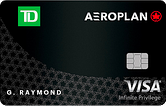

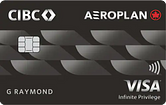

 $150 GeniusCash + Earn up to 85,000 Aeroplan®* points + Air Canada benefits.*
$150 GeniusCash + Earn up to 85,000 Aeroplan®* points + Air Canada benefits.*
